The Vaidalyaprakarana belongs to the Madhyamika school of Buddhist Philosophy. It demonstrates the logical impossibility of the existence of the Nyaya categories or padarthas as enumerated and dealt with in Gautama’s Nyayasutra and Vatsyayana’s Bhasya thereof. It belongs to the Indian philosophical tradition which did not admit the pramanas as valid means of knowledge. The Vaidalyaprakarana is immersed in the dialectical atmosphere that characterizes that tradition, although its aim is to show the groundlessness of Dialectics. The treatise gives a clear idea of the Madhyamika conceptioin of logic. It deals with many themes of Indian Philosophy. The present book contains an Introduction in which the authorship of the Vaidalyaprakarana is discussed, reaching the conclusion that, although the facts analysed by the authors “may not undoubtedly discard the authorship of Nagarjuna, at least they provoke a doubt regarding it – a doubt that is stronger in regard to the commentaryâ€. It also contains the edition of the Tibetan text on the basis of the Sde-dge, Cone, Peking and Snarthan editions, an English translation and a commentary by the authors, on the doctrinary contents of the treatise, and finally notes giving parallel pertinent texts.
Nagarjuna’s Refutation of Logic (Nyaya): Vaidalyaprakarana
$10.80
$12.00
In stock
Free & Quick Delivery Worldwide
All orders amounting to US$ 50 or more qualify for Free Delivery Worldwide. For orders less than US$ 50, we offer Standard Delivery at $14 per book.
ABOUT THE AUTHOR Carmen Dragonetti
Carmen Dragonetti has been Professors in the National Universities of San Marcos (Lima, Peru) and Buenos Aires (Argentina). He undertook investigation work of the National Council for Scientific Research (CONICET) of Argentina, in the area of Indian Philosophy. He was Vice-President and President respectively of the Institute of Buddhist Studies Foundation (FIEB) (Argentina); Directors of the Revista de Estudios Budistas (Journal of Buddhist Studies) REB, edited in Mexico; and Overseas Research fellows of The International Institute for Buddhhist Studies (Tokyo). Independently or in collaboration, he has published several books in Spanish on Indian Culture, specially on Indian Culture, specially on Indian Philosophy, as Yoga and Mysticism of India, Philosophy and Literature of India, Mahayana Buddhism; Buddhist Idealism, Buddhist ihilism; several translations into Spanish of important Sanskrit and Pali texts, as Hymns of the Rig Veda, Hymns of the Aatharva Veda, Upanisads, Bhagavadgita, Upadesasahasri, Gita Govinda, Amarusataka, Damodara Gupta, Dhammapada, Udana, Digha Nikaya, Sutta Nipata. In English he has published the Yogasutras of Patanjali and Nagarjuna's Regutation of Logic (Motilal Banarsidass).
ABOUT THE AUTHOR Fernando Tola
Fernando Tola has been Professor in the National Universities of San Marcos (Lima, Peru) and Buenos Aires (Argentina). He undertook investigation work of the National Council for Scientific Research (CONICET) of Argentina, in the area of Indian Philosophy. He was Vice-President and President respectively of the Institute of Buddhist Studies Foundation (FIEB) (Argentina); Director of the Revista de Estudios Budistas (Journal of Buddhist Studies) REB, edited in Mexico; and Overseas Research fellow of The International Institute for Buddhhist Studies (Tokyo). Independently or in collaboration, he has published several books in Spanish on Indian Culture, specially on Indian Culture, specially on Indian Philosophy, as Yoga and Mysticism of India, Philosophy and Literature of India, Mahayana Buddhism; Buddhist Idealism, Buddhist ihilism; several translations into Spanish of important Sanskrit and Pali texts, as Hymns of the Rig Veda, Hymns of the Aatharva Veda, Upanisads, Bhagavadgita, Upadesasahasri, Gita Govinda, Amarusataka, Damodara Gupta, Dhammapada, Udana, Digha Nikaya, Sutta Nipata. In English he has published the Yogasutras of Patanjali and Nagarjuna's Regutation of Logic (Motilal Banarsidass).
reviews
0 in total
Review by Anonymous
Be the first to review “Nagarjuna’s Refutation of Logic (Nyaya): Vaidalyaprakarana” Cancel reply
You must be logged in to post a review.
Bibliographic information
Title
Nagarjuna’s Refutation of Logic (Nyaya): Vaidalyaprakarana
Author
Edition
Reprint
Publisher
ISBN
8120809203
Length
xii+209p., Notes; References; 23cm.
Subjects

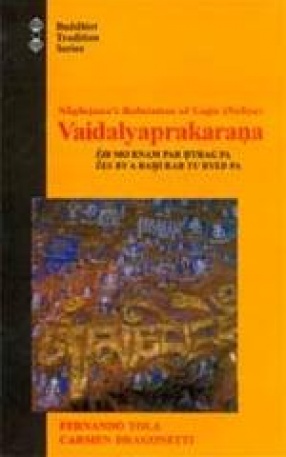
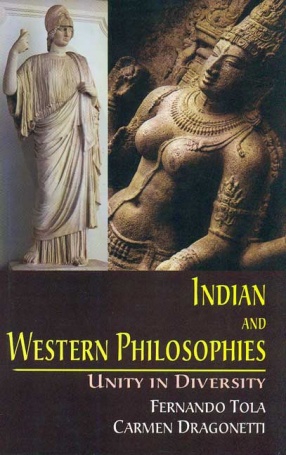
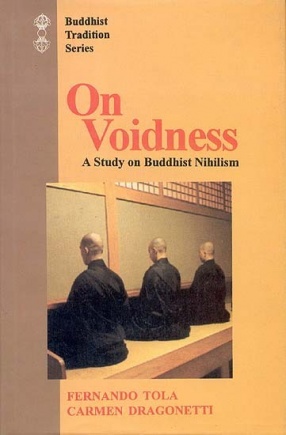
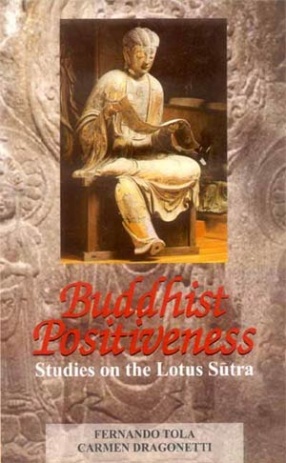

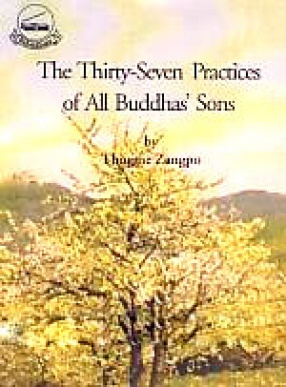

There are no reviews yet.